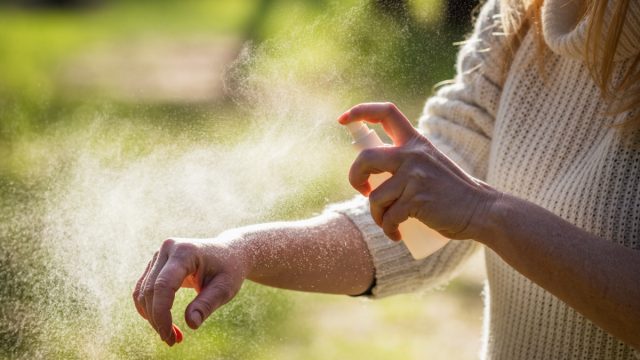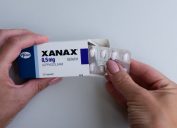Bug Spray May Cause Infertility and Birth Defects, New Study Shows
Researchers are concerned about potential harmful reproductive effects from DEET.

Depending on where you live, you probably don't have much need for bug spray right now, with cold weather currently rearing its ugly head. But when warmer temperatures eventually roll back around, it'll be time to stock up on insect repellent to keep mosquitoes and other pests at bay. Before you purchase your favorite brand this year, however, you might want to reconsider the kind you're buying. Researchers at Harvard Medical School (HMS) recently found that the most common bug spray ingredient, N,N-diethyl-meta-toluamide—better known as DEET—could cause reproductive problems, including infertility and birth defects.
RELATED: Gain Laundry Detergent Contains "Probable Human Carcinogen," New Lawsuit Alleges.
The study was performed in worms (known as C. elegans), which are useful subjects when researchers want to understand how toxins may affect human reproduction, according to HMHNews.
Products containing DEET come in liquid, lotion, and spray forms, and the chemical is also used in treated materials, senior study author Monica Colaiácovo, professor of genetics at Harvard Medical School, told Newsweek. While the main way DEET gets into our bodies is through the skin—typically where it's applied—the chemical can also enter via inhalation or if you drink water contaminated with DEET.
"It is estimated that an average of 1,800 tons of DEET are used annually in the U.S. and that approximately one-third of the U.S. population uses insect repellent products containing DEET each year," Colaiácovo said. There have been studies on the neurologic effects of the chemical, Colaiácovo told HMHNews, but her team looked into how it may impact reproduction.
To do so, HMS researchers looked at how several chemicals affected meiosis, the type of cell division that creates eggs and sperm, in worms. DEET was one of the "top hits" when chromosomes didn't separate like they were supposed to, and eggs ended up with an abnormal number.
This change happened because DEET impacted gene expression, or the genes that are active or inactive in a cell, Colaiácovo explained, and resulted in egg cells and worm embryos being "less healthy."
RELATED: FDA Warns Common Soda Ingredient Is Toxic to Your Thyroid.
"In humans, [errors in meiosis] can cause miscarriage, stillbirth, infertility, and genetic conditions such as Down syndrome," Colaiácovo told HMHNews. "We knew we had to look at this carefully. Research has shown that DEET products can have neurologic effects on people who use them, but no one had really looked at what DEET is doing in meiosis. We wanted to understand whether it would cause a problem. Only a few human studies have been done, and practically everyone uses DEET, so the possibility that it could affect reproduction felt palpable for people in our lab."
When asked how applicable this study is to humans, Calaiácovo said it's "always the big question." She pointed out that these worms have been used in the past to study environmental toxins, and they have several human gene equivalents.
The observed changes in meiosis also occurred when the worms had the same or lower levels of DEET as what's found in blood and urine samples from humans.
However, worms were exposed to DEET for 24 hours at a time, and these conditions may not apply to anyone or just to groups like agricultural workers, Colaiácovo said. In addition, there are also "physiological and metabolic" differences between worms and humans, and additional studies are needed.
RELATED: Pain Reliever Spray Recalled Over Cancer-Causing Chemical, FDA Warns.
The data, which was published on Jan. 4 in iScience, highlights the need to balance the potential harms of DEET in people, namely infertility, miscarriage, and birth defects, with the need to protect ourselves from diseases transmitted by insects (malaria, Lyme disease, West Nile virus, and Zika virus disease).
"My family is from South America, where Zika and dengue, for example, are common, and I want to make sure people are not scared away from being careful," Colaiácovo told HMHNews. "So-called tropical diseases transmitted by insects are moving into new regions of the world as the climate changes, putting more and more people at risk. The consequences of stopping the use of insect repellents can be very serious."
She noted that DEET is "a very effective option" for disease prevention right now, while also stressing that people should make themselves aware of the reproductive risks and follow application instructions.
If you're looking for a DEET alternative, Colaiácovo told Newsweek that there are others available, including synthetic and naturally derived repellent compounds, although data on their safety is limited. Natural choices, like citronella, lemongrass oil, and peppermint oil, are another choice, but they're also "less reliable," Colaiácovo said.
While you may want to consider how you use DEET or other insect repellents in general, it's that much more important if you're pregnant.
"Our work suggests this is very important for pregnant women because female meiosis begins in the developing fetus in the womb," Colaiácovo told HMHNews. "I would love to see research give rise to best practices for applying DEET products during pregnancy, when there's often so much confusion and anxiety about what to do or not do. I also hope our work helps drive the development of DEET alternatives that are safe and effective. It would be great to have an effective insect repellent that doesn't make us worry about our health or that of our children."
RELATED: For more up-to-date information, sign up for our daily newsletter.
Best Life offers the most up-to-date information from top experts, new research, and health agencies, but our content is not meant to be a substitute for professional guidance. When it comes to the medication you're taking or any other health questions you have, always consult your healthcare provider directly.





















